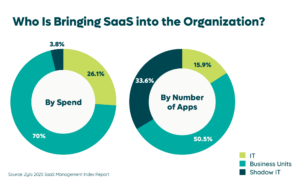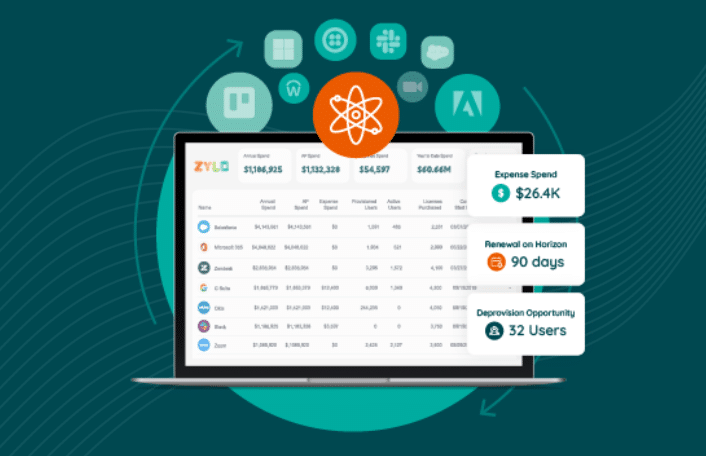Table of Contents
In the fast-paced world of business technology, Software as a Service (SaaS) solutions are becoming increasingly prevalent. Keeping track of all the applications your organization uses can be a daunting task.
IT departments no longer have complete purview and control of software, with 84% of applications being owned by lines of business and individuals. So, how do you know what apps exist? Often, it starts with your procurement or accounts payable systems; however, that only scratches the surface.
Among our 8+ years of experience leading SaaS Management, we find that SaaS commonly hides in expense reports. But it’s not as simple as it sounds. Misclassification, line items from marketplaces, and inconsistent descriptions from employees lead to apps going undetected.
Today, we’ll explore how Zylo has leveraged the capabilities of AI from the very beginning to power its Discovery Engine, setting it apart from competitors who rely on rule-based matching models.
The Challenge with Finding SaaS
As businesses adopt SaaS applications for various purposes, IT’s control over these applications has diminished. As we mentioned previously, 84% of applications sit outside of IT’s purview. When it comes to spend, a substantial 74% of SaaS spend sits with business units and individuals.

This decentralization creates a lot of chaos:
- There’s no consolidated buying process, so business units and employees may not use the proper channels to make a purchase when a need arises.
- IT, business units and employees are all buyers, dispersing SaaS throughout the business. This results in an incomplete picture of what applications you actually have.
- Many purchases hide in expense reports with a staggering 51% of transactions being misclassified. That makes it nearly impossible to identify them as SaaS.
- Data and knowledge live in silos, which makes it difficult to make intelligent decisions and align on the needs of the business.
Adobe Drives Innovation and Massive Savings with Zylo
In the past 4 years, Adobe has rapidly scaled from $9B to $18B. This growth has made an already complex environment even more complex. Learn how they leveraged Zylo to get complete visibility into their SaaS portfolio, unlock millions in cost savings and avoidance and improve the employee experience.
Types of Discovery
You can’t manage what you can’t see, and SaaS can be very difficult to visualize. This is what makes SaaS discovery so important, and a critical first step in SaaS inventory management. There are five key methods of discovery:
- AI-powered matching model: relies on pattern behavior, using machine learning to identify both known and unknown SaaS applications. This approach provides more flexibility and adaptability in recognizing new applications, making it a robust choice for SaaS discovery.
- Rule-based matching: depends on logic and known information, such as expense or spend type, supplier/vendor names, and predefined rules to classify whether an expense is related to SaaS.
- Cloud Access Security Brokers (CASB): utilizes and monitors company networks to track app usage and security details. Using a CASB for discovery can be challenging with hybrid and remote work situations. That’s because the technology is predicated on the assumption that all employees are accessing and logging in to tools either on the company network or through its identity provider.
- Browser extensions: similar to CASB, these rely on employees using company devices and/or networks and monitor data usage through their browsers. Browser extensions can feel like Big Brother watching over your employees and can lead to security concerns. This approach can also result in a lot of noise to uncover what software is being used vs. websites visited or interacted with by employees.
- Single sign-on (SSO): unifies employee access to a single sign-on credential. This credential is linked to an application that can gather and visualize data.
Why Rule-Based Matching Doesn’t Cut It
There are many SaaS management platforms today that adopt a rule-based approach. Despite their simplicity, this type of matching model comes with inherent limitations:
- Dependency on known information: These models require prior knowledge of suppliers or applications, making them ill-suited for identifying new or unfamiliar SaaS tools. Also, if you’re utilizing spend type or another classification, rule-based matching is only as good as the data it’s fed. If you put garbage in, you’ll get garbage out.
- Manual work and inconsistencies: You can likely perform this matching yourself in a spreadsheet, albeit manually. However, it is labor intensive, given the inconsistencies in expense classifications and vendor naming conventions. You might leave your IT department correcting data and investigating inconsistencies constantly.
- Lack of scalability: Rule-based matching provides a point-in-time view because it relies on data input at specific points (rather than automating intake and updating itself), making it challenging to keep up with the constantly evolving landscape of SaaS applications.
There are other issues within rule-based matching (as well as some benefits), but there’s a clear difference between rule-based and AI matching. Rule-based matching might have simplicity on its side, but AI matching can prepare you for anything.
Adobe Drives Innovation and Massive Savings with Zylo
In the past 4 years, Adobe has rapidly scaled from $9B to $18B. This growth has made an already complex environment even more complex. Learn how they leveraged Zylo to get complete visibility into their SaaS portfolio, unlock millions in cost savings and avoidance and improve the employee experience.
Why an AI Model Is Ideal for SaaS Discovery & How Zylo’s Matching Model Works
Zylo’s AI- and machine learning-powered Discovery Engine employs a sophisticated approach to uncover SaaS applications with precision and reliability. We’ll walk you through its four-step process so you know exactly how the Discovery Engine can revolutionize your SaaS management.
Step 1 – Ingest and Normalize Data
The Zylo Discovery Engine starts by ingesting all of your financial data. Whether through direct integrations or a flat file upload, it tracks direct purchases, employee expense transactions, and any other financial data you wish to include. It also goes beyond surface level expense data, including not only the charge name and type, but also the charge description.
Your financial data is then compiled and normalized to ensure consistency and accuracy in the subsequent analysis. Once the data is unified and normalized, the Discovery Engine plugs it into its models.
Step 2 – Analysis
Next, Zylo’s Discovery Engine analyzes the data. The model is trained on over $1T in spend data and the Zybrary, an extensive library of more than 24,000 applications. In short, its matching algorithms look through financial transactions to find all SaaS applications present within your organization.
The Discovery Engine was designed so that no stone goes unturned. The model identifies what is SaaS versus not SaaS, and classifies what software it is based on the Zybrary. After years of running and collecting data, our analysis shows high precision in identifying SaaS. It’s important to us that our customers have a clean source of truth from Day One of their SaaS management journey.
Step 3 – Verify
Following the analysis, the data is rigorously reviewed by our team of SaaS data scientists, who certify the accuracy of the identification process. If the model returns an uncertain result, the team reviews to confirm whether the transaction should be included in your SaaS inventory.
Step 4 – Refine
Final verified data is added back into the Zylo Discovery Engine, continually improving the accuracy of the machine learning algorithm with each successive analysis. This dynamic process ensures that Zylo’s platform maintains a real-time system of record for all SaaS applications.
Let’s consider new tools that come to market. Once verified by the data team and added back to the model, any future instances are detected as SaaS and added to our growing library of 22,000+ applications.
“Zylo provided the AI we used to identify current titles and categorize them according to functional area, saved approximately 500 hours at the onset of the project and became the backbone of how we divided our software portfolio.”
— Vinod Vishwan, Sr. Director, Head of Business Planning & Operations at Adobe
Effective SaaS Management Begins with Comprehensive Visibility
You can’t manage what you can’t see. SaaS discovery is key. Zylo’s AI-powered approach, which has been designed with precision and scalability in mind, empowers organizations to gain comprehensive visibility into their SaaS inventory.
In the ever-evolving landscape of SaaS applications, the ability to identify and manage these tools is paramount for organizations seeking to optimize their software expenditures and ensure compliance. Zylo’s AI-driven Discovery Engine offers a compelling solution that stands out from rule-based matching models, providing unmatched precision, scalability, and adaptability to grant your enterprise unparalleled SaaS visibility.
Effective SaaS management begins with comprehensive visibility, and Zylo’s approach meets and exceeds this requirement. By leveraging AI to uncover SaaS applications with unrivaled precision, Zylo enables organizations to take control of their software ecosystem, minimize costs, and maximize efficiency.
To experience the power of Zylo’s SaaS discovery firsthand, request a demo today.
ABOUT THE AUTHOR
Ben Pippenger
As Chief Strategy Officer, Ben is responsible for shaping and driving Zylo’s corporate strategy by monitoring and analyzing key market trends. As Zylo co-founder, he is passionate about the power of SaaS and helping organizations understand how they can manage, measure and maximize their investments for greater business impact. Ben is a self-proclaimed SaaS geek, with more than 20 years of B2B software experience, and a recognized SaaS and software management thought leader. Before founding Zylo, Ben held leadership roles in product and account management at Salesforce and ExactTarget.


 — Vinod Vishwan, Sr. Director, Head of Business Planning & Operations at Adobe
— Vinod Vishwan, Sr. Director, Head of Business Planning & Operations at Adobe